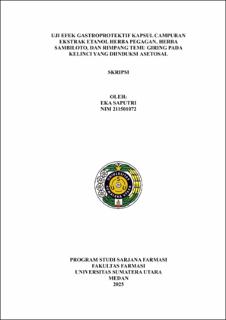Uji Efek Gastroprotektif Kapsul Campuran Ekstrak Etanol Herba Pegagan, Herba Sambiloto, dan Rimpang Temu Giring pada Kelinci yang Diinduksi Asetosal
Gastroprotective Effect of a Capsule Containing Combined Ethanol Extracts of Centella asiatica, Andrographis paniculata, and Curcuma heyneana Against Aspirin-Induced Gastric Ulcers in Rabbits

Date
2025Author
Saputri, Eka
Advisor(s)
Husori, Dadang Irfan
Laila, Lia
Metadata
Show full item recordAbstract
Background: Gastric ulcers are a gastrointestinal disorder that can be induced by side effect of nonsteroidal anti-inflammatory drugs (NSAIDs), such as aspirin. Mucosal damage caused by aspirin is triggered by reduced prostaglandin production, which plays a protective role in the gastric mucosa. Several medicinal plants, including Centella asiatica, Andrographis paniculata, and Curcuma heyneana, are known to exhibit gastroprotective activity. Therefore, this study aims to evaluate the gastroprotective effect of a capsule formulation containing an ethanol extract mixture of these three plants.
Objective: This study aims to evaluate the quality of the capsule formulation and examine the gastroprotective effects of the capsule formulation containing a mixture of ethanolic extracts of Centella asiatica, Andrographis paniculata, and Curcuma heyneana in rabbits induced with acetosal.
Methods: Gastric ulcers were induced in rabbits using aspirin. The test animals were divided into six groups and treated for seven days before being sacrificed six hours after the final induction. The gastric tissues were evaluated macroscopically, microscopically, and for gastric secretion parameters. Data were analyzed using One-Way ANOVA.
Results: The quality evaluation of the capsule formulation demonstrates that it complies with the established standards for weight uniformity and disintegration time. Furthermore, administration of the ethanol extract capsule formulation at doses of 104+78+39 mg/kg BW, 104+78+78 mg/kg BW, and 104+78+156 mg/kg BW demonstrated gastroprotective effects. These were indicated by improved ulcer parameters, including a reduction in ulcer index, increased gastric pH and mucus index, decreased total acidity, and improved mucosal structure based on lesion score, inflammation, and epithelial thickness.
Conclusion: The quality evaluation of the EPSG capsule formulation (ethanolic extracts of Centella asiatica, Andrographis paniculata, and Curcuma heyneana) at doses of 104+78+39 mg/kg BW, 104+78+78 mg/kg BW, and 104+78+156 mg/kg BW confirmed that the formulation’s physical characteristics were in accordance with the established standards, including uniformity of weight and disintegration time. Moreover, the ethanol extract capsule formulation at these doses exhibited gastroprotective effects through antisecretory, cytoprotective, and anti-inflammatory mechanisms.
Collections
- Undergraduate Theses [1833]
